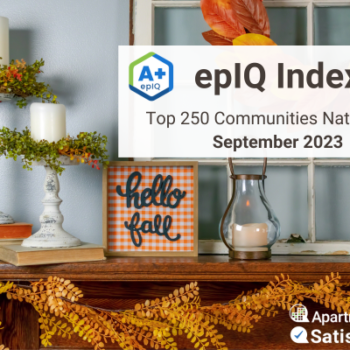As we strive towards sustainability and reducing our environmental footprint, waste management and recycling have become critical topics of discussion. But what do SatisFacts and ApartmentRatings have to do with waste management, you may ask? As it turns out, analysis of resident surveys has revealed that the appearance and condition of the community were among the top drivers for residents’ perception of value in 2022. And nothing detracts from the appearance of a community more than a dirty and overrun refuse area, which often becomes the subject of user-generated content on popular reviews sites like ApartmentRatings.
For property management teams, navigating the complex requirements and mandates of waste management can be overwhelming. But it’s not just management teams that are struggling – residents themselves are often unclear on how to properly dispose of their waste. As we dig deeper into this topic, we uncover a surprising truth: our trash is actually part of a complex energy feedback loop that impacts our environment in various ways.
According to national statistics, approximately 58% of waste ends up in landfills, 28% is recycled and reused, and around 14% is incinerated. While recycling efforts have gained momentum in recent years, our landfills still remain a significant source of human-related methane emissions in the United States. Methane is a potent greenhouse gas, with 25 times the heat-trapping potency of carbon dioxide, making it a major contributor to climate change.
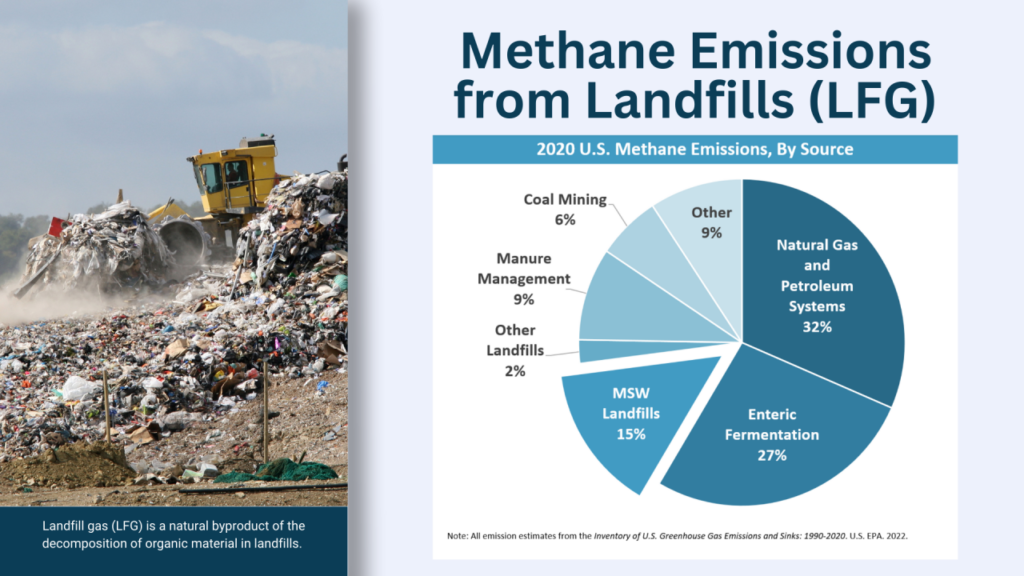
Cities and municipalities are now scrambling to implement regulations and requirements to minimize methane emissions and mitigate the impact of waste on the environment. However, the landscape of waste management regulations varies dramatically across regions, creating a patchwork of rules and guidelines for property management professionals to navigate.
As we face these challenges, it becomes clear that property management teams play a crucial role in ensuring their communities are up to the task. From understanding resident perceptions of value to navigating the complexities of waste disposal regulations, there is much to unpack in this multifaceted issue. Richard Bates, the Director of Waste and Diversion Strategies at Greystar, and Heath Hallada, the Founder of Hello Doorstep, joined host Carla J Alicea on Ready, Set…Respond, a free monthly webinar for multifamily professionals, to discuss the pressing issue of waste management and recycling in multifamily operations.
With their expertise and insights, Richard Bates and Heath Hallada provided valuable perspectives on the challenges and opportunities in this field, shedding light on the latest trends, regulations, and best practices. This informative webinar offers property management professionals a platform for a thought-provoking discussion on effectively managing waste and recycling in their communities, considering resident perceptions, environmental impact, and evolving industry standards.
Recycling and Its Impact on Landfills
Richard shed light on the impact of shifting from dual-stream recycling to single-stream recycling. He explained that the transition to single-stream recycling has resulted in less effective recycling, leading to increased waste in landfills.
The issue stems from the higher contamination rates in single-stream recycling, as residents are more likely to mistakenly include non-recyclable materials with recyclables in the same bin. This leads to more waste being sent to landfills instead of being properly recycled.
To tackle this challenge, Richard emphasized the importance of providing educational materials to residents to ensure they understand proper disposal methods. Fortunately, there are valuable resources available to assist in this effort, such as Recycle Across America and The Recycling Partnership. Recycle Across America offers a program that provides clear and visually appealing labels for recycling bins, making it easy for residents to follow proper recycling practices. These labels come in different sizes and shapes to suit diverse needs. Similarly, The Recycling Partnership offers a program specifically for multifamily that enables property managers to input local regulations and generate door hangers that can be distributed periodically to gently remind residents of proper recycling practices.
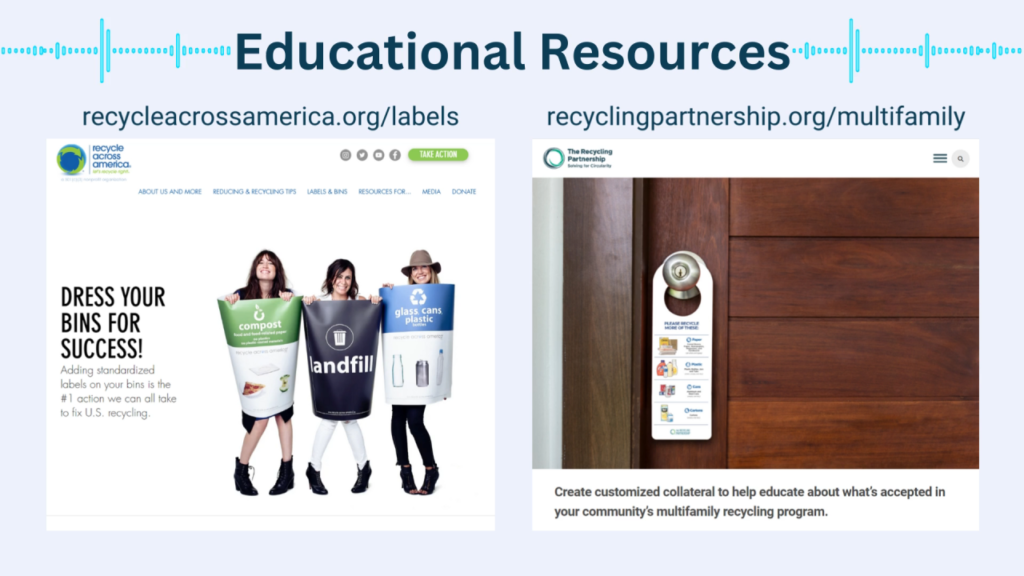
By leveraging these resources and implementing effective educational initiatives, property management professionals can play a crucial role in promoting sustainability and environmental stewardship in multifamily operations while mitigating the negative impacts of single-stream recycling on waste management and landfill waste.
Composting and the Organic Waste Stream
In addition to recycling, composting has become an emerging best practice for waste management and sustainability efforts. According to the EPA, about 30% of the waste that ends up in landfills is actually organic waste. To reduce greenhouse gas emissions and divert more waste away from landfills, composting has now become part of the Waste Management regulatory requirements.
Heath operates in Austin where there are already requirements in place for residential composting. “I would say in the next 12 months, you’ll see major traction on that (organic waste stream regulation). Since Covid, things have been a little delayed, but this is certainly a big emphasis in Austin right now. And we are gearing up and ready to tackle it.”
Richard underscores the significance of composting and organic waste management as a solution to the resource scarcity challenge. He emphasizes that participation in composting programs can be a valuable contribution towards sustainable waste management practices. However, he also acknowledges that there is a lack of providers and suppliers offering organic waste services in a manner that is convenient and appealing for residents. Bates encourages the adoption of composting solutions and calls for increased availability and accessibility of organic waste services to make it more feasible for residents to participate in composting initiatives. This highlights the need for continued efforts to promote composting and organic waste management as viable and sustainable options in waste diversion strategies.
Hazardous Materials Management
While discussing hazardous materials in the waste stream, Richard highlights the importance of implementing a consistent E-waste platform, specifically mentioning the increasing concern of lithium-ion batteries and other batteries used in various gadgets, such as bicycles, posing a significant fire risk hazard if improperly handled. He emphasizes that these batteries can ignite and cause extensive damage, with the risk of such incidents only expected to rise in the future. He suggests that implementing a solid E-waste platform is crucial for addressing this issue and ensuring proper disposal of hazardous materials.
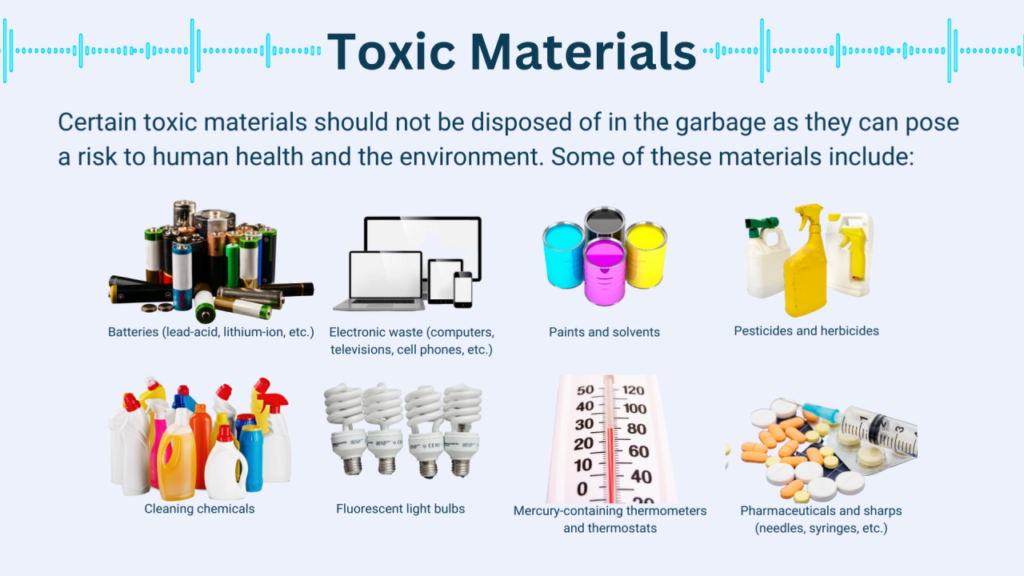
Bates also acknowledges that while there may be universal E-waste collection options available, they can come with higher costs, such as shipping labels and boxes. He recommends looking for local resources and solutions that may be more cost-effective. He encourages property teams to engage with local providers and resources to find regional approaches that suit their needs and budget and mentions consulting with experts like Heath in Austin, who are familiar with locally available resources and suggests involving valet providers in the process. This underscores the importance of considering regional and cost-effective solutions for managing hazardous materials, such as E-waste, in multifamily operations.
The Challenge of Bulk Item Pickup
For years, property managers and waste management companies have grappled with the problem of residents leaving behind discarded furniture, mattresses, appliances, and other bulky items when they move out. This has not only become a nuisance but also a significant financial burden, as the costs associated with disposing of these items can quickly add up.
Bulk item pickups are a constant headache for property managers, as they often find piles of couches or mattresses in various corners of the property. Richard notes that it remains a challenge for sites across the country. Many waste management companies have shifted away from the traditional method of using rear-load trucks with workers manually collecting bulk items and instead have started using side-load trucks. This change has made it more difficult for companies to find reliable and cost-effective options for bulk item pickups across a portfolio.
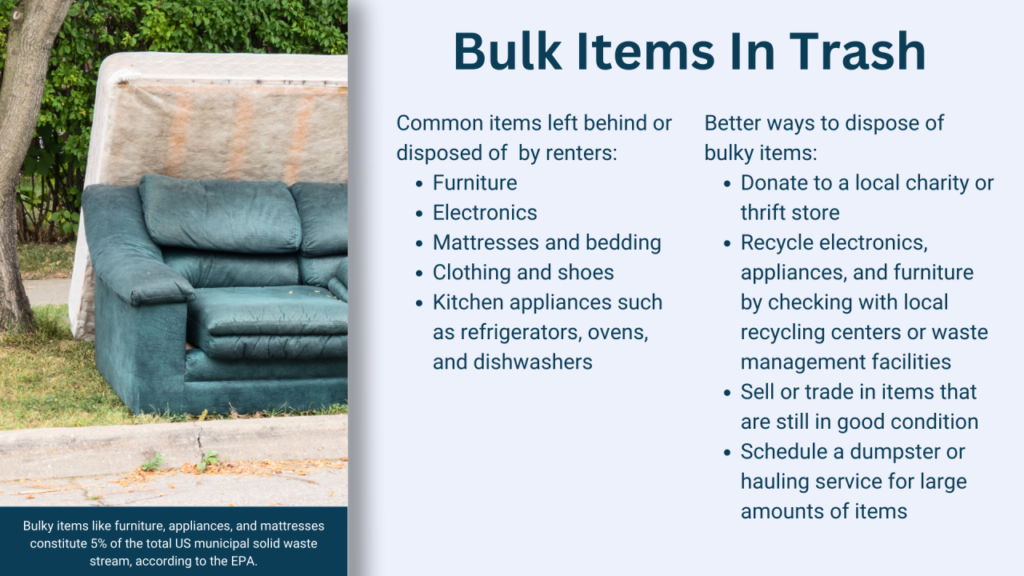
In order to tackle the growing concern of bulk item pickups in multifamily communities, waste management experts, Richard and Heath, emphasize the need for a proactive approach. Richard highlights the importance of incorporating bulk item pickups into the waste management plan for such communities, rather than waiting for items to be left behind. This can include setting up designated areas for residents to properly discard bulky items and creating storage spaces for smaller volumes, streamlining the disposal process. On the other hand, Heath recommends exploring on-demand or scheduled services from waste management providers, citing their reliability and cost-effectiveness compared to ad-hoc solutions. Timely pickups can prevent bulk items from being left behind, minimizing operational disruptions. By implementing these proactive measures, property managers can effectively address the issue of bulk item pickups, ensuring a cleaner and more efficient living environment for residents.
Waste management and recycling challenges in multifamily operations are complex and multifaceted issues that require attention from property management professionals, residents, and regulatory bodies alike. It is evident that property management teams play a crucial role in promoting sustainability, mitigating environmental impacts, and navigating the evolving landscape of waste management regulations. By considering resident perceptions, environmental impact, and industry best practices, property management professionals can effectively manage waste and recycling in their communities, contributing towards a more sustainable future for multifamily operations.
Check out the “Don’t Be Trashy: A Dumpster Dive into the State of Recycling and Waste Management Programs” webinar to learn more about reducing waste and promoting sustainability in your company and community.


